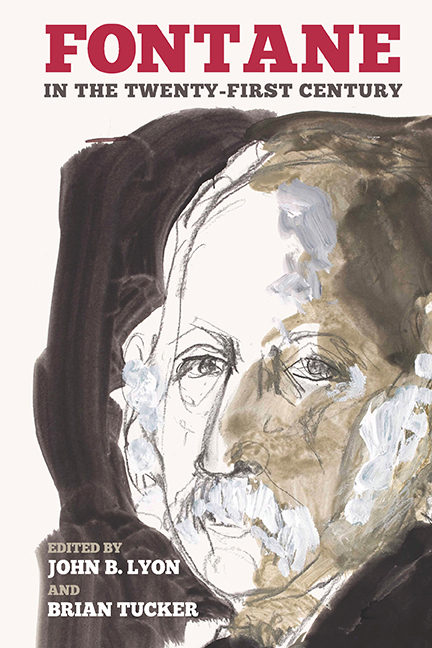Book contents
- Frontmatter
- Contents
- Acknowledgments
- Note on Editions
- Introduction: Fontane in the Twenty–First Century
- 1 Narrative Digression and the Transformation of Nationhood in Vor dem Sturm
- 2 Nasty Women: Female Anger as Moral Judgment in Grete Minde and Effi Briest
- 3 Performing the Philistine: Gossip as a Narrative Device and a Strategy for Reflection on Anti-Semitism in Theodor Fontane's L'Adultera
- 4 To Have an Eye: Visual Culture and the Misapprehension of Class in Irrungen, Wirrungen
- 5 Fontane as a Pacifist? The Antiwar Message in Quitt (1890) and Fontane's Changing Attitude to Militarism
- 6 Disjunctive Transnationalisms in Fontane's Frau Jenny Treibel
- 7 On the “Right Measure” in Effi Briest: Ethics and Aesthetics of the Prosaic
- 8 Transfiguration, Effect, and Engagement: Theodor Fontane's Aesthetic Thought
- 9 Fontane and World Literature: Prussians, Jews, and the Specter of Africa in Die Poggenpuhls
- 10 Von Zwanzig bis Dreißig: The Male Author in Parts
- 11 Melusine von Barby's Barriers and Connections in Fontane's Der Stechlin
- 12 Senescence and Fontane's Der Stechlin
- Notes on the Contributors
- Index
3 - Performing the Philistine: Gossip as a Narrative Device and a Strategy for Reflection on Anti-Semitism in Theodor Fontane's L'Adultera
Published online by Cambridge University Press: 31 August 2019
- Frontmatter
- Contents
- Acknowledgments
- Note on Editions
- Introduction: Fontane in the Twenty–First Century
- 1 Narrative Digression and the Transformation of Nationhood in Vor dem Sturm
- 2 Nasty Women: Female Anger as Moral Judgment in Grete Minde and Effi Briest
- 3 Performing the Philistine: Gossip as a Narrative Device and a Strategy for Reflection on Anti-Semitism in Theodor Fontane's L'Adultera
- 4 To Have an Eye: Visual Culture and the Misapprehension of Class in Irrungen, Wirrungen
- 5 Fontane as a Pacifist? The Antiwar Message in Quitt (1890) and Fontane's Changing Attitude to Militarism
- 6 Disjunctive Transnationalisms in Fontane's Frau Jenny Treibel
- 7 On the “Right Measure” in Effi Briest: Ethics and Aesthetics of the Prosaic
- 8 Transfiguration, Effect, and Engagement: Theodor Fontane's Aesthetic Thought
- 9 Fontane and World Literature: Prussians, Jews, and the Specter of Africa in Die Poggenpuhls
- 10 Von Zwanzig bis Dreißig: The Male Author in Parts
- 11 Melusine von Barby's Barriers and Connections in Fontane's Der Stechlin
- 12 Senescence and Fontane's Der Stechlin
- Notes on the Contributors
- Index
Summary
FROM STERNE's Tristram Shandy to Melville's Bartleby, from Dostoyevsky's Idiot to Flaubert's Bouvard et Pécuchet, from sentimentalism to realism, oddball characters play an important role in reflecting poetic strategies, making way for the modernist revolution of eccentric subjectivity. This proves true for German literature as well: influenced by Sterne, the topos of the oddball, the Sonderling, manifests its poetic and political reflexive power in the works of Jean Paul. From there it develops into a central motif of nineteenth-century humorist literature from E. T. A. Hoffmann to Friedrich Theodor Vischer and Wilhelm Raabe—all of them avid readers of Jean Paul. And it continues to play a crucial role in the poetics of writers such as Robert Walser, Thomas Bernhard, or Sybille Lewitscharoff.
The reflexive potential of the oddball character results from a “postromantic” relation between eccentricity and the philistine: in traditional romantic poetics, phantasms of political as well as cosmic unity are defined by their differentiation from notions of seemingly boring normality. In contrast, the humorist tradition follows Jean Paul's paradigm, according to which the sublime is repeatedly subjected to interventions by the small and the inept, which thwart any dreams of societal and cosmic harmony. Insisting on the inevitability of both the ordinary and the exalted, “postromantic” perspectives create opportunities for new configurations of eccentricity. The character of the oddball can serve to reflect such poetic strategies by challenging notions of philistine normality without ultimately transcending them.
However, there are ambiguous outliers of Sonderlingsliteratur, characters that don't belong unequivocally to the humorist tradition but still employ parts of its motivic tradition. Such is the case with L'Adultera (1882), Theodor Fontane's first novella concerning contemporary matters: one of its main characters, the Berlin financier Van der Straaten, is distinctly portrayed as an oddball character in line with the humorist tradition. But Fontane's realist project itself clearly departs from Jean Paul's poetics. This challenges the notion of the oddball character's reflexive dimension: is his ability to mirror poetic and political issues still effective outside of a strictly humorist paradigm?
My goal in this paper is to show that the reflexive powers of the oddball character in L'Adultera remain intact: In the foreground the novella tells the story of Van der Straaten, a somewhat elderly man obsessed with gossip and proverbs, and his much younger wife, Melanie, who will eventually leave him for a younger man.
- Type
- Chapter
- Information
- Fontane in the Twenty-First Century , pp. 48 - 62Publisher: Boydell & BrewerPrint publication year: 2019



